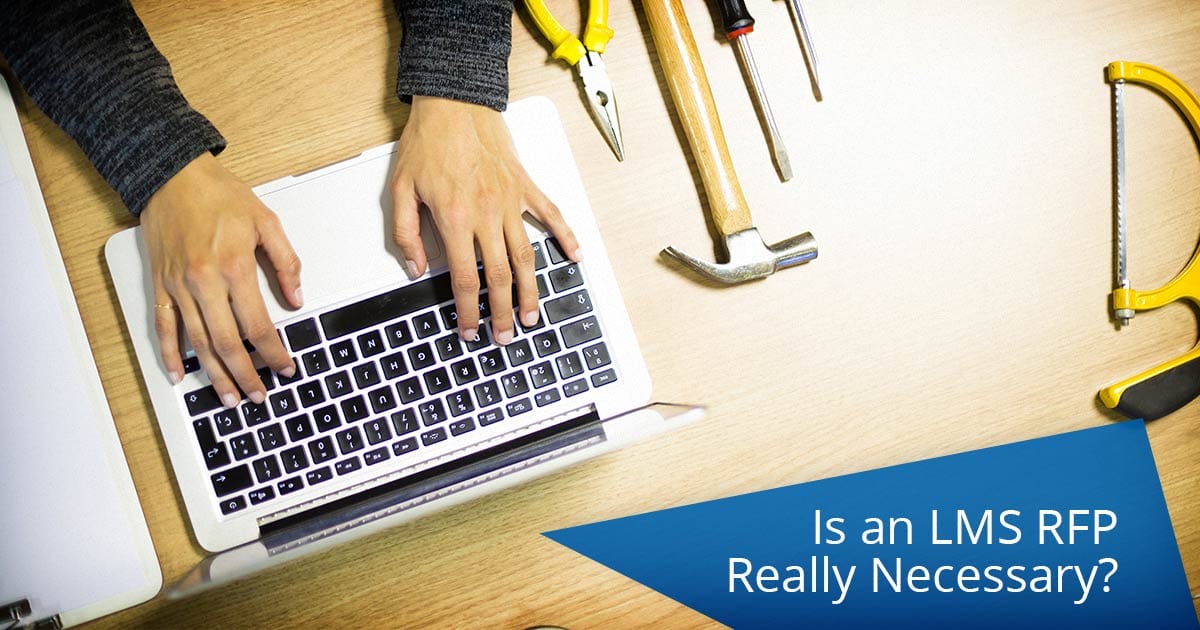
Selecting an LMS? Learn whether or not you need to go through the RFP process
An RFP (Request for Proposal) is commonly used by businesses looking to purchase technology. The RFP process can help streamline the decision-making process by making it easier to evaluate vendors and avoid the costly consequences of making an uninformed purchase decision.
Whether you’re considering newly purchasing an LMS or switching your current system, simply reading “RFP” might make your palms sweat. Going through the RFP process can often be tedious and expensive – but how can you determine whether or not the process is necessary for your particular learning project?
In our upcoming webinar, How to Create an Effective RFP for Your LMS Project, we’ll cover this in more depth. Until then, the following factors can help you decide whether or not you’re ready to go through with the LMS RFP process.
You should submit an RFP to LMS vendors if…
Your LMS project, timeline, and budget have been approved.
Evaluating vendors is often labour intensive and expensive. Since the purpose of an RFP is to help guide your LMS purchase decision, it should already be decided that your organization is ultimately going to go through with a purchase, and that you have a clear plan for what you want out of your learning technology project.
You’ve clearly defined your LMS requirements.
When defining your LMS requirements, Talented Learning’s John Leh recommends going beyond a standard list of LMS requirements. Instead, he suggests using RFP templates that are available on the Internet as a reference point, and then taking the time to clearly define your own requirements as they apply to your use case. This will help you avoid choosing a standard LMS that is either too robust or not specific enough to meet your learning needs.
You want to properly evaluate and qualify vendors.
There are hundreds of learning management systems out there and, obviously, you don’t have time to evaluate them all and not all of them will fit your learning needs and budget requirements. One of the key benefits of submitting RFPs is that it allows you to efficiently evaluate LMS vendors and then build a more structured comparison. This organized approach will make it easier to determine which vendor(s) will be a good fit in less time.
You should not submit an RFP to LMS vendors (yet) if…
You haven’t clearly defined your LMS use case and learning goals.
You’d be surprised how many companies don’t understand exactly how learning technology will be used to reach their organization’s learning and development goals. Before you build out your learning requirements, you need a clear plan in place as to how an LMS is going to provide great ROI (and how you’re going to measure it).
You haven’t done your research.
While it’s true that the RFP process is supposed to help guide your LMS decision, RFPs should only be submitted to qualified vendors whom you’ve researched and who can likely meet your predefined learning requirements. It is not the LMS vendor’s responsibility to educate your organization on what you need in an LMS – it’s up to you as a buyer to understand the industry, the competition, and then to make an informed purchase.
You’re not substantially investing in a learning project.
An RFP is most helpful when you have a lot to lose – that is, you’re making a substantial investment of time, resources, and budget in learning technology. If you’re seeking a low-cost learning solution or aren’t ready to fully invest in an LMS, the RFP process might not be a productive use of time.
If you’ve determined that submitting RFPs might make your LMS selection process a little bit easier, don’t panic. The RFP process can be tedious and confusing, but it doesn’t have to be – join Docebo and Mark Smith, CEO of Ventana Research, for a webinar where we’ll teach you how to navigate the LMS RFP process.
Register for our webinar: How to Create an Effective RFP for Your LMS Project.
